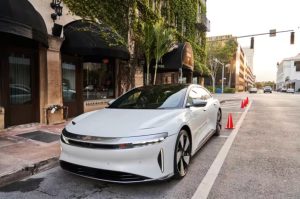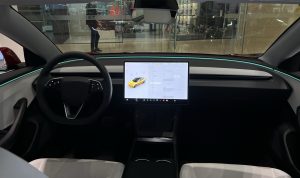Weirdness Abounds in the U.S. Electric Vehicle (EV) Stock Market
7 min read
While it was expected that the biggest and most fantastical IPO bubble in the U.S. stock market this year would eventually burst, the speed of its “collapse” has been somewhat surprising.
Just 26 days ago, on August 15, the richest man in Vietnam, often referred to as the “Vietnamese Elon Musk,” Pham Nhat Vuong, took his electric vehicle brand, Vinfast, public on the U.S. stock market. Vinfast was founded just five years ago.
Pham Nhat Vuong’s rags-to-riches story is quite remarkable. He started his journey by selling instant noodles in Ukraine and later made his first fortune in food and by founding the related company, Technocom. Afterward, he returned to Vietnam and established Vincom, which primarily focuses on shopping centers, high-end offices, and apartment development. He also founded the real estate and entertainment company Vinpear. He eventually merged these two companies into Vingroup and took it public in Vietnam. Vingroup expanded into almost all profitable industries, including education, healthcare, and mobile devices.
Pham Nhat Vuong’s significance to Vietnam is akin to what Samsung is to South Korea. Just as every South Korean can’t escape Samsung, it’s challenging for Vietnamese to avoid Vingroup.
In 2017, he expanded his business empire into the electric vehicle industry with the founding of Vinfast. According to Pham Nhat Vuong, the goal of Vinfast was to make cars for the nation. He positioned Vinfast as the “Vietnamese Tesla” because he believed that Vietnam needed at least one globally recognized brand, and electric vehicles were the key to achieving that goal.
Whether it was due to the imagined blue ocean of new energy vehicles in Vietnam or Pham Nhat Vuong’s reputation as the richest person and his wealth, Vinfast’s stock price skyrocketed initially, and its market capitalization reached $210 billion. Pham Nhat Vuong’s personal wealth also surged to $66 billion, ranking him 16th on Forbes’ global billionaire list.
However, his moment in the spotlight didn’t last long.
As market conditions changed, and investors returned to a more rational view of the electric vehicle industry, Vinfast’s stock price began to decline. In less than a month after going public, Vinfast’s market value plummeted significantly, and Pham Nhat Vuong’s wealth also decreased sharply. His fortune is now valued at just over $5 billion, and he ranks around 500th on the list of billionaires.
While Pham Nhat Vuong is significant to Vietnam, his involvement in too many industries carries risks. In recent years, he gradually shifted his focus to the electric vehicle industry and even sold Vingroup’s domestic retail, smartphone, and television businesses in Vietnam to provide financial support. However, the future of Vinfast remains uncertain in the highly competitive electric vehicle industry.
Vinfast introduced six models (both combustion and electric) before going public by acquiring General Motors’ automotive production line in Vietnam. Despite this, the company faced criticism for its product quality and reputation. Before going public, Vinfast delivered only 18,700 electric vehicles out of a total of 105,000 vehicles delivered domestically in Vietnam.
The U.S. capital market initially showed little enthusiasm for Vinfast. Stymied in its efforts for a traditional IPO, Vinfast opted to go public in the U.S. through a SPAC (Special Purpose Acquisition Company) merger. However, in the U.S. market, Vinfast’s products faced many questions, and the volatile stock price reflected market uncertainty about its future prospects.
What’s even worse is that the $9.3 billion Vinfast raised before going public mostly came from Pham Nhat Vuong himself, with only a $150 million external financing round in June. Today, Vinfast still lacks the ability to generate revenue. The market capitalization of all public companies in Pham Nhat Vuong’s hands is barely over $20 billion. The doubt remains about how much support he can provide for the capital-intensive car-making business.
Part Two
SPACs are similar to shell companies in the A-share market, meaning they are already listed but have no actual business operations. Compared to traditional IPOs, SPACs offer a faster path to going public with fewer restrictions and relatively lenient regulations during the listing process. This makes them an efficient way for startups to raise funds. To some extent, SPACs are attractive to speculative investors and businesses.
In October 2022, as a domestic real estate crisis spread in Vietnam, Pham Nhat Vuong was implicated. At the end of that month, he signed a deal with Ningde Times Chairman Zeng Yuqun in Osaka, dispelling earlier speculations. This move conveyed his determination to enter the car manufacturing industry.
At that time, the SPAC craze had cooled down, and U.S. electric vehicle startups were facing difficulties. Nikola Corporation, often touted as the “Tesla of trucks,” was deep in trouble, with its founder Trevor Milton sentenced in court. Milton was found guilty of three criminal charges (two counts of wire fraud and one count of securities fraud), with a maximum possible sentence of 20 years in prison.
In the second year after the debut of the Model S in 2014, the wave of new energy vehicles arrived in Silicon Valley and China. Nikola was founded by Milton in the United States, inspired by inventor Nikola Tesla. Milton hoped Nikola could rival Tesla. On the other side of the ocean in China, “Wei Xiaoli” (NIO) was gradually taking shape.
In less than two years, Milton used only a PowerPoint presentation to tell Wall Street an imaginative story about Nikola’s future production of a series of hydrogen fuel cell trucks, in-house battery technology, and plans to build 700 hydrogen refueling stations in North America. At that time, his PowerPoint presentation contained only simple introductions to two truck models, with no definite production timeline. The last time the public had heard such familiar phrases might have been when Jia Yueting launched his electric car project.
However, this single PowerPoint presentation allowed the less than six-year-old Nikola to go public through a SPAC in 2020, with a valuation reaching $3 billion. After going public, driven by Milton, the company’s market capitalization briefly exceeded that of the second-largest U.S. automaker, Ford, reaching $30 billion.
Today, the company has received delisting warnings, with a market capitalization of only about $754 million remaining. However, these issues are not Milton’s concern anymore, as he has already been ousted from Nikola. His sentence will be announced later this month.
Part Three
Starting from 2020, Tesla’s stock price surged, increasing by 93% in less than two years, and its market value even surpassed $1 trillion. Elon Musk also became the world’s richest person. Tesla’s success prompted Wall Street to go crazy over new energy vehicle manufacturers, even though they knew they were walking into a trap.
Since 2020, the SPAC frenzy provided an efficient fundraising pathway for startups looking to profit from the electric vehicle boom by replicating the Tesla myth.
In
fact, as early as September 2020, short-selling organizations accused Nikola of being a complete “scam” just three months after its IPO, claiming that everything from Milton’s product videos to his official announcements about technology and components were fake.
While Milton was aggressively promoting Nikola, the short-selling organization released a more than 20,000-word report three months after its IPO, causing a public outcry. Milton was subsequently removed from the company’s board of directors. During the same period, Steve Burns, the founder of Lordstown Motors, sat in the White House telling a similar story.
Behind the endorsement of former President Trump, Lordstown Motors successfully went public through a SPAC merger. Ironically, Steve Burns had purchased this car company from another person just over a year ago. In reality, Lordstown and Nikola had almost identical car production scripts – no technology, no products, and success based on the founder’s “hype.” Coincidentally, both companies were exposed by short-selling reports, and Steve Burns was ousted. Currently, Lordstown has applied for bankruptcy protection.
Milton and Steve Burns, despite being removed from their respective companies, did not receive any responses from their “idol,” Tesla.
Interestingly, two other electric vehicle companies, Lucid and Rivian, received a “letter” from Musk. At the time, Musk said, “They are not long for this world.”
Part Four
Different from Musk’s wide-ranging interests, Rivian’s founder is solely focused on technical research and is determined to make cars. After earning a Ph.D. in mechanical engineering from the Massachusetts Institute of Technology in 2009, he founded the company. He led the team throughout the entire research process. Unlike many other car industry entrepreneurs, this founder is a strict tech enthusiast, and his company primarily focuses on electric trucks and SUVs. It took him ten years to develop a pickup truck and an SUV.
Rivian’s investors are quite prestigious, including Amazon, Ford, BlackRock, Fidelity, and Saudi Arabia’s Public Investment Fund. Amazon is Rivian’s largest single shareholder and its biggest customer. Before going public, Jeff Bezos had ordered 100,000 electric delivery vans from Rivian. Lucid Motors, founded by Bernard Tse, one of Tesla’s original board members, and Sam Weng, a former Oracle executive, also has the support of Saudi Arabia’s Public Investment Fund and specializes in luxury electric cars.
Both Rivian and Lucid were once touted as “Tesla killers.” With a full lineup of products and technology, and backed by capital, they were highly praised. However, as the SPAC frenzy subsided, they also fell from grace.
Delivery delays, production problems, and frequent quality issues led to a reduction in production targets, resulting in a steep drop in market capitalization for both Rivian and Lucid. In 2021, after going public, Rivian’s market capitalization briefly reached $126.8 billion, making it the third-largest automaker globally, behind only Tesla and Toyota. Today, its market value is only around $20 billion. Lucid suffered a similar fate, with its market capitalization plummeting from over $40 billion to just over $10 billion.
Performance-wise, both companies are struggling as well. From 2019 to the first half of 2023, Lucid reported accumulated net losses of over $6.4 billion, while Rivian’s net losses totaled $15.4 billion.
Last year, an investment research firm even listed Rivian as a “zombie company,” and Lucid is considered to have high risks. Elon Musk once offered this advice, “Unless they make a big change, they will go bankrupt.”
In conclusion, aside from Tesla and BYD, there are very few electric vehicle companies that are profitable. With supply chain pressures, rising raw material and labor costs, many global automakers are destined to go bankrupt. Among them, quite a few once-promising projects may become nothing more than jokes.


